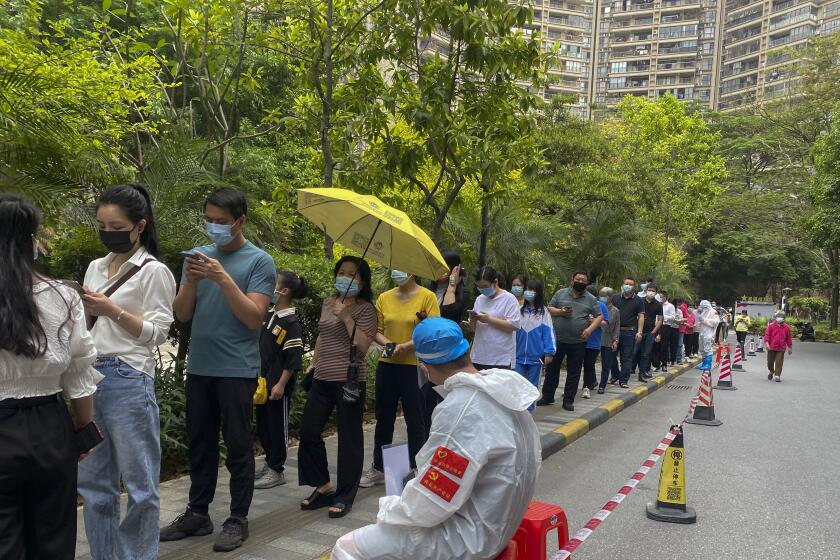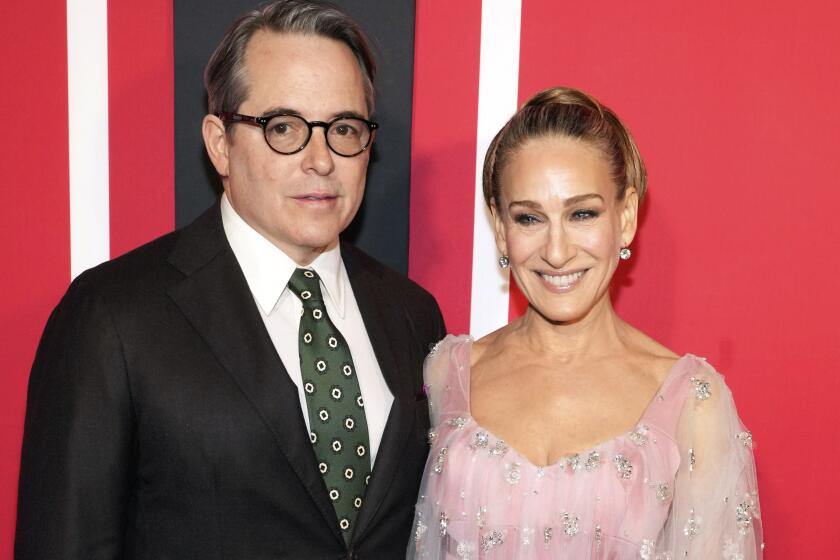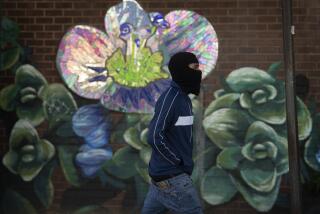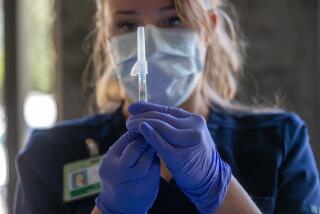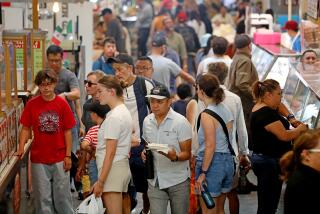Philadelphia becomes first major U.S. city to restore indoor mask mandate
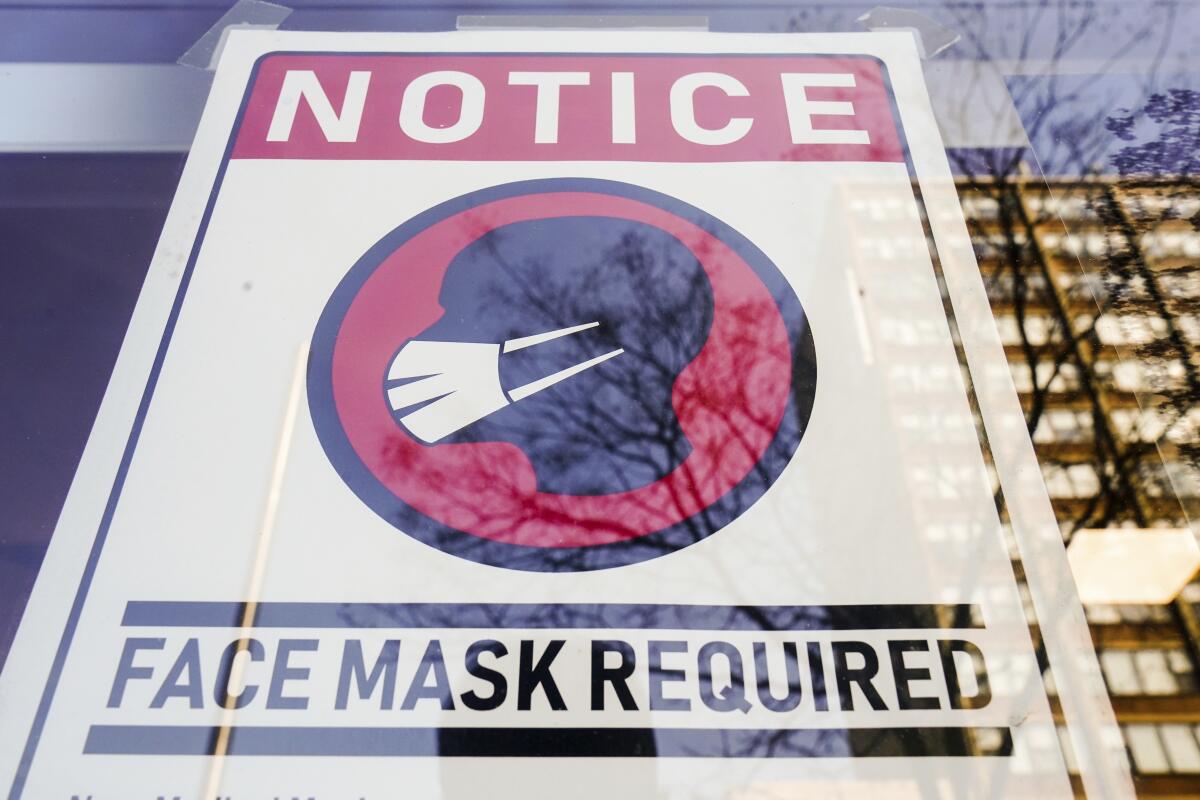
- Share via
PHILADELPHIA — Philadelphia became the first major U.S. city to reinstate its indoor mask mandate on Monday after reporting a sharp increase in coronavirus infections, with the city’s top health official saying she wanted to forestall a potential new wave driven by an Omicron subvariant.
Health inspectors will start enforcing the mask mandate at city businesses starting April 18.
Confirmed COVID-19 cases have risen more than 50% in 10 days, the threshold at which the city’s guidelines call for people to wear masks indoors, said Dr. Cheryl Bettigole, the health commissioner. Health officials believe the recent spike is being driven by the highly transmissible BA.2 subvariant of Omicron, which has spread rapidly throughout Europe and Asia, and has become dominant in the U.S. in recent weeks.
“If we fail to act now, knowing that every previous wave of infections has been followed by a wave of hospitalizations, and then a wave of deaths, it will be too late for many of our residents,” Bettigole said. “This is our chance to get ahead of the pandemic, to put our masks on until we have more information about the severity of this new variant.”
Most states and cities dropped their masking requirements in February and early March following new guidelines from the U.S. Centers for Disease Control and Prevention that put less focus on case counts and more on hospital capacity. The CDC said at that time that most Americans could safely take off their masks.
Philadelphia dropped its mask mandate March 2, and Bettigole acknowledged “it was wonderful to feel that sense of normalcy again.”
“I sincerely wish we didn’t have to do this again. But I am very worried about our vulnerable neighbors and loved ones,” she said.
The manufacturing hub of Guangzhou has closed itself to most arrivals as China battles a COVID-19 outbreak in its big eastern cities.
The city is reporting more than 140 cases per day — a fraction of what it saw at the height of the Omicron surge — and hospitalizations remain low at only 46 patients. About 750 Philadelphia residents died in the wintertime Omicron surge, Bettigole said.
Health inspectors will start to enforce the mask mandate at city businesses starting April 18.
The restaurant industry pushed back against reimposed masking, saying workers will bear the brunt of customer anger over the new rules.
“This announcement is a major blow to thousands of small businesses and other operators in the city who were hoping this spring would be the start of recovery,” said Ben Fileccia, senior director of operations at the Pennsylvania Restaurant & Lodging Assn.
Bettigole said masking will help restaurants and other businesses stay open, while a huge new wave of COVID-19 would keep customers at home.
In New York City, Mayor Eric Adams has paused his push to unwind many of the city’s virus rules as cases have risen, opting for now to keep a mask mandate for 2- to 4-year-olds in city schools and preschools. But Adams, a Democrat who has said New Yorkers should not let the pandemic run their lives, has already lifted most other mask mandates and rules requiring proof of vaccination to dine in restaurants, work out at gyms or attend shows.
The U.S. is getting a first glimpse of what it’s like to experience COVID-19 outbreaks during this new phase of living with the virus.
Adams was asked at a virtual news conference Monday afternoon if he was considering reimposing the New York City mask mandate in light of Philadelphia’s decision. The mayor said he would listen to his team of medical doctors for their advice on whether to bring back any restrictions. Adams himself tested positive for COVID-19 on Sunday.
New York City is now averaging around 1,800 new cases per day, about three times higher than in early March, when New York began easing rules. That does not include the many home tests that go unreported to health officials.
Rubinkam reported from northeastern Pennsylvania. Associated Press reporter Michelle L. Price in New York contributed to this report.
More to Read
Sign up for Essential California
The most important California stories and recommendations in your inbox every morning.
You may occasionally receive promotional content from the Los Angeles Times.
